It was fixing to be another long night. We weren’t complaining: this year, we’d been able to set aside a full week to float every night. The Hex hatch is annual, of course, but it’s tough to know which nights of which week will be worth fishing. The best way to hit a good night or two — a good spinner fall or two — is to fish more nights.
So I drove over to Michigan, set up at Dave’s small camp near Grayling, and we fished. After five nights, the missed hours of sleep were stacking up. One hopes that a sustainable third-shift kind of schedule might emerge, a move to the nocturnal, but in reality a tent warms to solar-oven levels early in the morning this time of year. You sleep as late as possible, but it’s never enough. Still: we weren’t complaining. The bugs, and the fishing, had been good.
The night before had ended with a four-fish bend. A train of spent bugs, collected in the long slick upstream and gathered into a narrow curved line of star-lit bubbles, spasmed their death-throes in the surface film. At the apex of the turn, four trout heads rose and fell like the piston rods of some invisible watery engine. Also invisible were the micro seams and overhanging brush that would make getting a clean drift nearly impossible. Three of us, taking turns, eventually hooked all four fish, but it took an hour, or maybe two — the passage of time is difficult to intuit in the pitch dark. Four good drifts out of a thousand casts; two of the trout easily stretched past the twenty-inch mark on my net handle.
But now it was Friday night. News of the good spinner falls had percolated downstate and the nine-to-fivers — us, most years — were up north en masse, a sudden shift in human biomass, like the one that Hexagenia limbata makes as it migrates from streambed to sky every summer. The takeout lot, where my truck had been alone all week, was jammed with vehicles, many adorned with lodge and guide stickers.
So our plan was to put in late. Be the last boat down the river. Bat cleanup. The first few hours of a Hex float is usually downtime anyway. You push downstream and bank a mile or two against having to do it after the fishing. There’s time for beer, and to speculate about water and air temperature, humidity, wind, and whatever other mysterious factors are relevant to whether or not the bugs go.
Not that any of it matters at that point; all you can do is float, whether the bugs go or don’t. But if they do, the guides — with their diurnal sports who will be happy to have a shot or two and be off the water by 2 a.m. — will be well over halfway through the eight-hour float by the time it happens. We’ll still be up high on the beat, listening for fish that nobody’d cast to all week. We were headed for a long, cold push into the early morning hours; but it would be better than playing bumper boats all night.
The sun was deep behind the trees as Dave parked his Jeep. I held the raft which was bouncing in the current at the end of the rope, like an eager pony before a nighttime coup-counting raid. We shoved off and slowly worked downstream, rods stowed but taught with fresh leaders and fresh spinner patterns, both tied that evening at camp. As ready as we could be.
And still we weren’t ready.
We were so spinner-focused that we didn’t notice the emergers vibrating the surface film in the muddy inside bends. In a fast run we saw the first rise, then a second and a third. Smaller fish, judging by the riseforms, and we didn’t blink. This time of night and year, scattered Isonychia spinners are not uncommon, nor even a few tardy brown drakes. Hex season is like that: smaller rising fish can be passed up with a little thrill of hubris. We’re here to catch trout, but not those trout. Not tonight.

But then at the bottom of the run, a big one rose. No bowling ball, but no gentle sip either: the unmistakable resonant clap of a big trout’s upper jaw closing on the surface. That’s when the first Hexagenia drake flew past us, huge, purple and yellow, wings rasping in the still air. And then we saw them wriggling on the surface all around us. Lots of them.
“Holy shit,” Dave said. “It’s an emergence.”
We dropped anchor mid-run, and it snubbed tight — too tight. A deep logjam, as it turned out. We were upstream of the fish, instead of across from it. Dave worked his rod out from beneath the raft frame, and made a difficult cast, downstream, and stack-mended. The fish didn’t eat. It rose again — smack — while he was preparing another cast, again presented perfectly, and again it did not take.
“I should have changed to an emerger pattern,” he scolded, and lined up his third cast. A Hex emergence is often brief, and limited to certain stretches that contain the organic muck the nymphs live in. We could feel the window sliding shut on our fingers. Probably similar to how the bugs feel, if they can feel, as they struggle at the surface. It’s the hardest fight they’ll ever face, Dave likes to say: at their scale, the river’s hydrogen-bonded ceiling is an almost impenetrable barrier. Then they must split their exoskeleton, unfold and dry their wings, and take flight, and try not to think, if they can think, about the hunting trout below.
On his next drift Dave’s inappropriate spent-wing was eaten early by one of the smaller fish. It thrashed on the surface, kept aloft by the power of his eight-weight. The upstream-set hook came loose, and the leader sprung backward and triple-hitched around his rod tip. He sat down heavily and began to untangle. The big fish didn’t rise again.
But soon another did. Clomp. Farther downstream, where the river turned sharply right. The rings of the rise, half-hidden by brush, barely caught the fading blue of the sky. Dave leaned on the anchor but it would not budge. He handed me the rope, rowed upstream until it was tight, and gave a grunting pull on the oars. It popped free, and he held the boat upstream of the logjam while I hauled the anchor in.
We slipped down to the bend, trying to breathe quietly. I changed flies. Dave let the anchor drop and it softly, properly, bit into sand. He cocked one oar out a little to angle the boat, hooked it under his knee, and resumed untangling. I stood in the bow, emerger pattern pinched in my left hand, eight-weight in my right, and waited, eyes and ears straining. The first few stars blinked through the pines.
And then: a subtle flicker of glare just off a trailing alder branch. I think. No sound. A rod-length reach cast put my fly there, the flash reappeared, and I raised my rod hard into a solid fish. As it shook its head and dove, another fish rose — louder — in the exact same spot. And then another, thirty feet downstream, and another, echoing from around the next bend.
“Oh my God,” Dave said, one-hand scooping the fish, his tangled rod in the other. He handed me the net and went back to work, a little more frantically.

I leaned over the side to unhook the fish but the hook was already out. I slid my hand beneath its belly and lifted it up just high enough so I could watch as it slipped over the edge of the net. We tend to measure trout in length; but when you’re holding a big one, it’s the girth, compared to your hand, that makes an impression. And this one did.
I stowed the net and my rod and swapped spots with Dave. We waited. Gulp. A glimmer of spreading rings in the last light. Dave measured his cast. “A little farther out,” he whispered, and I pushed on the oar and the bow of the raft crept two feet to the right. He laid his fly down. Chomp.
Those were the only two fish. After releasing Dave’s, we floated the next hour in high readiness, fingers tingling with anticipation. Later we stuffed them in our wader pockets as a chill fell in the valley and a thick fog rose from the water. No spinners flew, and we never saw another boat.
We had almost six hours of cold river to talk through the evening’s twenty-minute action. Our sleep-starved minds began to trip and stumble over the words emerger, emergent, and emergency. Add in the fouled anchor and the quickly-fading light and it’s amazing we caught any fish at all.
We weren’t complaining.
As we ran our post-float shuttle, the stars in the east began to disappear.
“Same float tonight?” I asked.

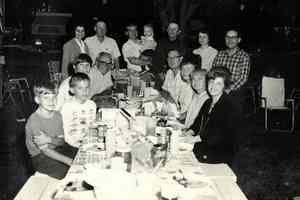


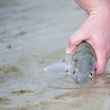
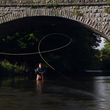
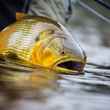





















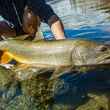
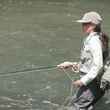

Comments